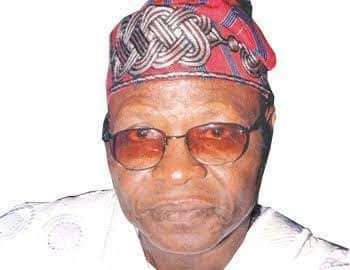Chief Cornelius Olatunji Adebayo, the newly elected chairman of the Movement for National Reformation (MNR), has charged members to be tenacious and undistracted even as the 2023 general elections approaches.
Chief Adebayo gave the charge in his acceptance speech via a press release sent to Neptune Prime and signed by Dr Philip Idaewor, General Secretary.
READ ALSO: Restructuring: 'No Need As Nothing Wrong With Nigeria'-Obj
“Work and stay tenacious and undistracted by political short-term gains or losses and ensure that our undertaking on restructuring can become a topical and mainstream issue in Nigeria’s politics starting from debates and discussions during the 2023 election campaign,” he said.
Chief Adebayo has been an integral member of the MNR since its inception in 1992 being the first General Secretary when the founding fathers including the late Alfred Rewane and Abraham Adesanya, Chief Olaniwun Ajayi, Ayo Adebanjo, Alhaji Ganiyu Dawodu, Dr Olu Onagoruwa and Chief Anthony Enahoro who was the founding chairman conceived the idea of birthing the organisation.
He eulogised and celebrated the memory of the founding leaders who had the foresight to start the movement, and many others who joined later, but who, sadly have passed on.
According to the new chairman, the founders were the architect of change who set out to plant a tree and not grasses.
He reminded members to be mindful of the founding aims and objectives of the movement as “A non-partisan, non-governmental Think-Tank whose aims and objectives are to conduct in-depth analysis of and research into, the socio-economic and political problems facing Nigeria, its ethnic nationalities and citizens and actively mobilise the people and work towards the resolution of the identified challenges. Work for the Convocation of a People’s National Conference (PNC) to address the National Question and for a National Referendum on the Recommendations of the Conference.”
“Propagate the ideals and practices of democracy and the promotion of a democratic culture in Nigeria. Work for the integration of the best values of indigenous cultures with the ideals and process of democracy.”
While reiterating the achievements of MNR for championing and achieving some success in these areas, he reminds the members whom he called the Apostles of change that quite a lot are still left undone, saying, “The previous challenge was that because of her problems, Nigeria as a country was making very minimal developmental gains by the day. But today, any conscious political observer would realise that we have moved further dangerously towards a fragile state status.”
He also observed that “The urgency and scope of Nigeria’s unfinished political liberation were aptly captured by Chief Enahoro in his remarks made at the send-off banquet organised in his honour in New York City on the 11th of November 1999, when he said our country has been liberated from direct external rule, but the liberation of our people is as yet incomplete. We of the MNR believe that the next step in the true liberation of our people is the recognition and empowerment of our nationalities, the establishment of true democracy within the nationalities, and the prescription of equitable relationships between the nationalities which choose to live under one flag. Chief Enahoro went on to call on MNR members to dare to conceive, let us dare to contrive and strive and let us dare to hope.”
Chief Adebayo further noted that “It is this realisation that has motivated this revival of the MNR with the hope that we can re-energise the vision, mobilise the manpower and the organisational capacities to catch-up with the lost time more so as the problems have worsened.”
In its examination of the state of the nation, the MNR observed that Nigeria “a developing, multi-ethnic, multi-religious and multi-cultural country is faced with many developmental challenges, such as poor infrastructure, lack of adequate manpower, ethnic balance of power struggles for power and influence, poorly educated citizens, lack of financial facilities, etc. However, 60 years after obtaining her independence from Britain, it has somewhat comparatively underperformed below its potential and similar under developed countries, overwhelmingly because of its poor management of its ethnic diversity challenges.
“These challenges were already emerging over 30 years ago which compelled the founding leaders of the MNR to call for urgent reformation of the Nigerian superstructure to hasten national maturation towards a more balanced and equitable country.
“Clearly, Nigeria with over three hundred composite ethic nationalities remains a subject in existential threat of failure: incapable of delivering to its population a stable and consistent improvement to the quality of life perfecting an image of political immaturity and moral fragility, and most tragically Nigerians today live under more dire strait and the pillars of a modern state are collapsing in Nigeria .
“Our movement considers This situation an aberration. The revived MNR aims to work with all patriots and nationalists in a non-partisan framework or context to provide the moral and political guidance and drive to ensure that the Nigerian experiment becomes a federative socio economic success in post colonial Africa south of the Sahara.”
Follow the Neptune Prime channel on WhatsApp: https://whatsapp.com/channel/0029Va74ZvU2v1IqKByXoX3d
Do you have breaking news, interview request, opinion, suggestion, or want your event covered? Email us at neptuneprime2233@gmail.com


